- Home
- Joanne Harris
The Evil Seed Page 25
The Evil Seed Read online
Page 25
‘I’ve been a bastard, haven’t I?’ he said in a subdued tone. ‘I blew up at you this morning, I even made a hole in your wall. I behaved like a complete prat, and the stupid thing is, I already knew you were right about those two blokes. I’d seen them before, and I saw them again today with Ginny. I knew they were selling dope as well, and she was taking it. Shit, you can’t know somebody like that and not …’ He pushed his hair out of his eyes. ‘I just hoped that it wasn’t true, I hoped I could stop it being true by bawling you out and not listening. I just couldn’t take the idea that I was being taken for a ride again.’ He paused. ‘I’m sorry, Al.’ He made an angry little gesture and rubbed his eyes with the back of his hand.
‘Poor Joe.’ Alice sat on the arm of the chair and put her arms round him, smelling tobacco from his coat and the clean smell of his hair. Nostalgia overwhelmed her.
Quietly Joe shifted the white marble paperweight to his right hand. The rhythm grew stronger inside him.
Alice saw the movement of his right hand, and she twisted, instinctively, to the side. The paperweight missed her head, and smashed into her shoulder. Joe was taken off-balance as the momentum pitched him out of the chair, and Alice had the time to leap back, to try and get something in-between them.
She had time to think: That’s not Joe.
When suddenly he sprang, raking at Alice’s face with the hand which held the paperweight. She jumped back, at the same time kicking out at him with her right foot to keep him at a distance. She wobbled, almost lost her balance, and in the time it took for her to regain it he was on her, grabbing her by the hair and lifting the paperweight to smash her face. Alice kicked again, reaching his shins squarely this time, taking him by surprise. He loosened his grip and fell backwards, hitting his head on the angle of the table.
A second later Alice had scrambled to her feet and was at the door, unlatching it with trembling fingers.
‘Alice! Come back! Alice!’
But his voice was already distant – a jumble of words on a rushing wind.
Her eyes were stinging as the wind rushed her down the streets and alleys towards Grantchester. And maybe it was Alice’s imagination, but as she made her way across the river to Rosemary’s house it seemed to her that, with every step she took, that fairground reek grew stronger: smoke and sweat and roasting peanuts, burnt sugar and petrol fumes and animals.
PART FOUR
Beata Virginia
One
SHE FOUND A place for us to hide; in the apartment she had used before she married Robert. It was quite large, with two bedrooms, a bathroom, a little kitchen and a living-room, and she had continued to pay the rent because it was a good place for her to stay when she didn’t want to be seen by him.
Not that poor Robert ever asked any questions; when she went out she told him she was going to see a friend, almost challenging him to make something of it, but he accepted what she said without a word.
Rosemary left us in the flat, gave one of the spare keys to me, and the other to Zach, and went home. It had been a long night, and she meant to go and get a shower, and sleep. For myself, sleep was beyond me. I tried for an hour or so to persuade Elaine to talk, but she would do nothing but cry, curled up on the sofa with her face hidden in her hands. I abandoned hope of ever getting a clear account of what had happened from her, so I indulged in a solitary game of chess (left hand against right), drank most of a bottle of red wine Zach had left me, and tried to make sense of what had happened that night.
Perhaps even then, I had some hope of proving to myself that there was a logical explanation for everything. Elaine had not been dead, merely stunned. Inspector Turner had missed her heartbeat as he felt in the thick coat she had been wearing. It must seem strange to you that I tried to disbelieve it, I the man who had witnessed so many dark miracles that by now I must have been immune to them. But I was not. Perhaps even then, I hoped to awaken from the nightmare, to prove to the ever-optimistic doubter within me that there was an explanation for all of the past few months. I was insane. I was ill, perhaps terminally so; maybe I had a brain tumour which gave me delusions. Somehow, the thought of death did not alarm me as once it might have done. It was the thought of life, yes, of that kind of life, which made me shudder.
The thing which convinced me of the reality of what I had seen was its very simplicity. If I had had to invent a resurrection my mind would have formulated something complicated; there would have been rituals, invocations, magic, science, anything but the bleak simplicity of this monstrous act. If there had been something there for me to analyse I would have felt secure; I could have believed in Mary Shelley’s Frankenstein monster, brought to life by science, I could believe in secret amulets and magical potions, in words of power and holy signs, but not in this. My mind rebelled.
Despairing at last of either sleep or quietude, I decided to go for a short walk, thinking the night air might calm my thoughts. Even the knowledge that by now the carnage at the police station must have been discovered did not deter me; I found that I really did not care whether I was arrested or not. I took my coat and hat, opened the door to the apartment and locked it again behind me. I saw no one as I went down the stairs and into the street; although the dawn was beginning to show, threadlike, on the horizon, it was still too early for any idle passers-by to be abroad. I was about to cross the street, making my way to the river, when a small movement caught my eye, from the alcove at the side of the building, where the dustbins were kept. My heart jumped, but I told myself that it could only be a dog, nosing for scraps among the rubbish.
The movement came again, a kind of fitful scrabbling among the bins, too big to be a dog. I took three steps forwards, blinking into the darkness. The figure pressed itself further into the shadows, as if it were trying to sink into the brick wall of the alcove. It was a man.
‘Hey, you,’ I called. ‘Who are you? Come out.’
The man did not reply, but I caught a little sound from his lips, a kind of wordless plea.
‘Come out!’ I stepped forwards again, overcome by curiosity, and saw him lift grimy hands towards me in supplication.
‘Leave me alone.’ His voice was little more than a whisper. There was something in it that I recognized, and I squinted at the man with a new interest.
‘Who are you?’
He turned his face towards me, pale above the crumpled suit. For a minute I blinked, unable to put a name to the familiar face, then I recoiled, even though the man was in no condition to do me harm.
‘Turner!’ I said, and he cringed away. The man’s icy poise was broken for ever, his face a mass of tics and twitches. He was evidently in deep shock.
‘I won’t hurt you,’ I said, reaching out a hand. He pulled away with a little cry but I followed him into the alcove.
‘I won’t hurt you,’ I repeated, pulling my flask from my coat pocket. I shook it, guessed it to be about half-full.
‘Here, drink this,’ I said, ‘it’s whisky.’ A grimy hand struck mine, knocking the flask aside. But I forced it against his mouth. Some of it went in. I heard him swallow, noisily, like a dog, and then I heard the sound of him sobbing.
‘I followed you,’ he said, almost inaudibly. ‘I didn’t know where else to go.’ He was silent for a minute; I used his own technique on him, waiting for him to say more.
‘What did you see?’ I said at last.
‘I was in the lavatory. Someone came to the door. Higgins answered. It was a girl. He asked her in … Oh God!’
‘You saw her,’ I said. ‘You saw Rosemary.’
‘Rosemary … I never thought …’
‘What else did you see?’
‘She came in,’ he said, in his whispering voice. ‘And those others came in behind her. I hid …’ He whimpered, a pitiful sound.
‘What else did you see?’ I hated to torture him, but I had to know.
‘She went into the morgue … and I heard her say: “Elaine”. Just that.’
‘Is that
all she said? Just her name?’ I could hardly believe it had been so easy. And yet, thus had Christ raised Lazarus. ‘Come forth.’ Some miracles should never be performed.
‘Turner. I want you to listen,’ I said. ‘I need to talk to you.’
He looked at me, his eyes wide. ‘You know, I didn’t believe you,’ he said. ‘I thought you were lying, or mad. I was so sure of everything.’
‘Listen,’ I said. ‘I know a place. It’s safe. I’m going to take you there. I want to talk to you.’ I lowered my tone. ‘I need your help.’
He turned his gaze towards me.
‘Help?’
‘That’s right,’ I said. ‘It’s safe where we’re going. You can sleep there.’ I hesitated, thinking that in his condition, he might not be in a state to help anyone. Yet, I thought, if he was mad he might still be of some use. I had no use for sanity on my side. What I needed was madness.
‘You’re going to help me,’ I told him. I put my arms around his shoulders and half-lifted him to his feet.
‘We’re going to kill Rosemary.’
I looked after Turner for three days, in the first of a deserted row of houses just outside Grantchester. He was shocked and terrified at first, but began to recover as time passed. I developed a kind of friendship with him, spending as long as I could with him while the others were sleeping. I brought him food, clothes, bottles of wine. Most of all, I talked to him. I told him what I planned to do, no longer for my own sake, but to salvage the little humanity left in me. He had moments of sanity interspersed with long periods of mania, reminding me forcibly of myself in those first dark days of the hunger.
When the little death came upon me, I went out and hunted on my own, or I went to Elaine for scraps of the night’s hunt, but I did not run with the others again. For one, I was too afraid of the police, who had now launched a national inquiry into what they called the ‘Cambridge Police Station Tragedy’. Hundreds of extra police had been sent for from London, and policemen patrolled the night from ten o’clock onwards, questioning any passer-by. A semi-official curfew had been established, although Lamb of the Yard had proclaimed that the killings had probably been the work of a lunatic. So while the police chased rumours and false trails through the town Turner and I talked, feverishly, like two lunatics ourselves. I went over my findings and my theories, sharing every thought with him.
Rosemary permeated all our conversations. Rosemary at her most beguiling and her most deadly. I shared her with him like a lover; the sweetness of her and the poison. With him, I exorcized her, invoked her, murdered her a thousand times in thought and intention. For three days we contemplated murder, then we struck.
It was the last day of August.
Two
SHE WAS NOT certain what she would have done if anyone had been in the house; but they were not. It was boarded up and deserted, as were the houses all around, and she knew, with sudden certainty, that this was where the creatures met.
Looking at the place for the first time in daylight, she saw that the roof had partially collapsed, the slates stripped off to reveal the blackened beams. All but the very highest windows were broken, half-shielded from the rain by boards, but at one glass-fanged window the rags of a scorched curtain still remained, flapping in the wind like a black flag. Cautiously, she came closer, until she was facing the door. This too was broken, the wood rotten and the hinges half-torn away so that it stood ajar, almost invitingly, like a door in a fairy tale. Behind a cracked glass panel to her left, Alice could still read the names of the erstwhile tenants:
S. . PPER 1
. . SHLEY 2
. . KIN 3
KEN … Y 4
The house had stood empty for decades. Alice looked around, but the street was deserted. Then, taking a deep breath, she pushed the door and stepped forwards into the darkness.
The house was damp and stank of urine, mould and an under-smell of the circus. The nightwalkers were not the only ones to have used it as a hiding-place: on the ground floor Alice found traces of other visitors, sweet-wrappers and silver paper and plastic bags and empty tubes of glue. A box of broken toys had been dumped in one corner of the room, but dust covered it in a thick veil. Alice found herself wondering what had happened to those young trespassers, and she shivered.
The house was so silent and deserted that until she reached Rosemary’s apartment she had almost begun to believe that she had been wrong, and that the nightwalkers had found some other place to hide; but as soon as she pushed the door to apartment 2 ASHLEY she knew that her instincts had been right.
There was a mattress in one corner, piled with blankets, and a table, and some chairs lined up against one of the smoke-blackened walls. Wine bottles littered the floor; a pack of cards had been left spilled across the rotten boards. A shoe-box containing syringes and silver paper on the window-ledge. Candles in empty wine bottles. Tied to the door-handle, a white rag, marked with bloody hieroglyphs.
The atmosphere and the sense of predestination almost paralysed Alice. It seemed to her that there were ghosts in the very air she breathed, ghosts like fumes invading her mind so that before long she was the one who felt unreal. Her sense of scale temporarily eluded her; here she was infinitely tiny, helplessly huge, suspended in limbo, racing faster than light. She was a puppet, jerking here and there on a cherry-coloured twist of string, dancing, spinning, struggling to breathe …
Alice tore herself from the paralysis and ran to the window, gasping air. The ghosts and illusions dissipated, and she forced calm upon her fraught spirit, learning to breathe again, reassembling her fractured thoughts.
There could be no more cowardice, she thought. No more hope of evading this commitment she had somehow accepted. When she had escaped from Joe, a hot stitch biting into her side as she ran down alleys and dodged under archways, she had somehow shed most of the burden of fear which had paralysed her. How it had happened she did not know; she simply knew that somewhere between Cambridge and Grantchester she had decided to survive, and that however ill-equipped she might appear to bring down Rosemary and her friends, she would give whatever she had to do it.
A sound jolted Alice out of her reverie, and she turned, the roots of her hair beginning to stiffen. In a single movement she had pulled out the knife and had turned to face the slight, grey figure which had detached itself from the shadows to speak to her.
‘So you’re here at last.’
Alice, the knife held out in front of her, adrenalin-charged blood singing in her ears, recognized the sparse grey hair, stubbly face, rheumy eyes and pink muffler; it was the tramp she had met the previous night. For a moment she hesitated, but, remembering Joe, held on to the knife.
The old man nodded, almost covertly. He seemed sober now; maybe it was still too early in the evening for him to be really far gone.
‘What are you doing here?’ Her lips were dry.
The old man nodded again.
‘Same as you,’ he said. ‘Just about. I reckoned you’d be here sooner or later.’ His critical glance took in the knife, her pallor, the stubborn look behind her fear. Scared, he thought, but behind all that, there was an underlying toughness of which even she herself was not aware.
‘Remember me?’
Alice nodded, still wary.
The old man smiled, not pleasantly.
‘I’m not what you think,’ he said. ‘It’s just a good way of getting people to leave me alone.’
Alice narrowed her eyes at him, re-assessing her earlier opinion.
‘I remember you from the other night. Had a look to you, like you were planning something.’
The voice had changed subtly, had sharpened, the back was straighter, the eyes less rheumy.
‘I’m not sure I know what you’re talking about,’ said Alice.
‘Of course you know. I know what you saw in Grantchester that night, and I know you’ve read Daniel Holmes’s book.’ He took a step towards her, as if to punctuate what he was saying.
‘Don
’t move.’ Her eyes fixed his with a hard light, and the point of the knife rose a little. ‘How did you know about that?’
The man shook his head with a little gesture of irritation.
‘Put that down, girl, we don’t have time.’
‘Not a chance,’ said Alice. ‘I’ve had that trick pulled on me once today already. Now if you want to talk—’
Suddenly, the old man’s hand snaked out towards Alice. Before she had time to lash out, he had grabbed the hand which was carrying the knife and twisted it sharply. His fingers jabbed stiffly into the back of her hand. Alice jerked backwards instinctively, and found that he was holding the knife half an inch from her throat, his other hand locking her left arm firmly and agonizingly at the elbow and shoulder, the pain of the lock forcing her on to her toes. He held her for a couple of seconds longer, then released the hold.
‘Here’s your knife back,’ he said, holding it out by the handle. ‘Next time you have to pull it on someone, use it to cover your body and keep them at arm’s length. Don’t just poke it at them like that.’ His voice was amused. ‘Now, will you please put it away?’
Alice pocketed the knife, still rubbing her aching shoulder.
‘What do you want?’
‘You’ll want to hole up in the house for a while. If you go right up to the roof, you’ll find there’s a little room there with a stash of stuff, couple blankets, chocolate, flask of tea, all that. You can take what you want. You wait there till night comes. I’ve got some cans of petrol piled up there, too, you’ll know what they’re for later. You—’
‘Wait a minute,’ said Alice, recovering from her astonishment. ‘Who are you? What the hell are you doing here, anyway?’
‘I might well ask you the same thing,’ he said. ‘I’ve been watching you.’
‘Why?’
‘Because it’s time you realized what you were up against,’ he replied. ‘Time you let an old man tell you what he knows.’ She looked at him, wondering for an instant whether he was as sober as he seemed. His red-rimmed eyes were crazy as broken glass. He nodded.

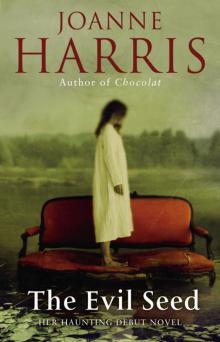 The Evil Seed
The Evil Seed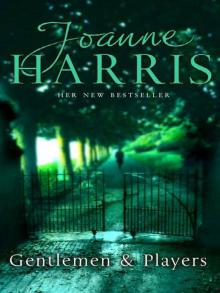 Gentlemen and Players
Gentlemen and Players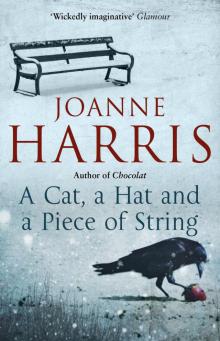 A Cat, a Hat, and a Piece of String
A Cat, a Hat, and a Piece of String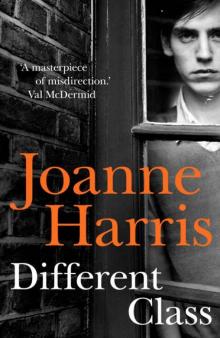 Different Class
Different Class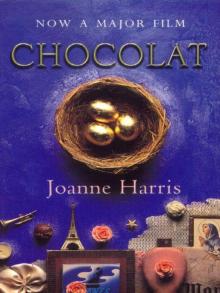 Chocolat
Chocolat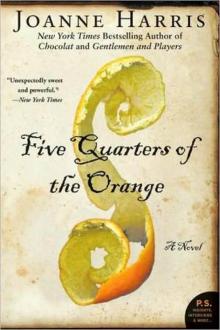 Five Quarters of the Orange: A Novel
Five Quarters of the Orange: A Novel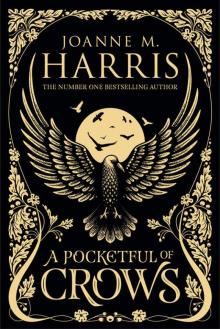 A Pocketful of Crows
A Pocketful of Crows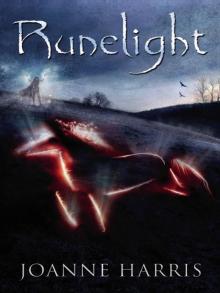 Runelight
Runelight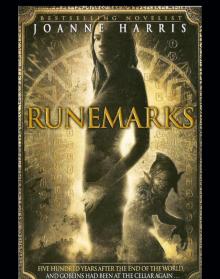 Runemarks
Runemarks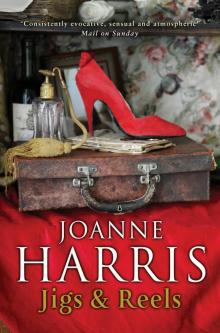 Jigs & Reels: Stories
Jigs & Reels: Stories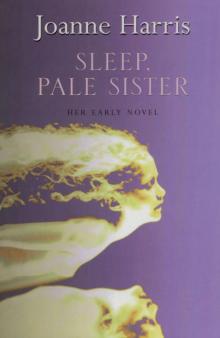 Sleep, Pale Sister
Sleep, Pale Sister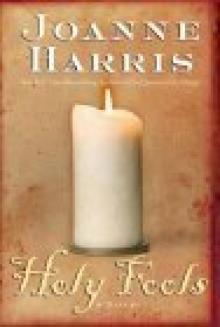 Holy Fools
Holy Fools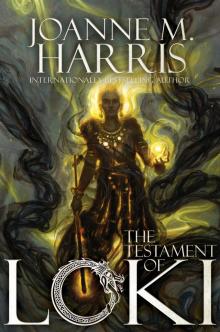 The Testament of Loki
The Testament of Loki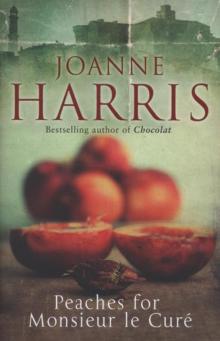 Peaches for Monsieur Le Curé
Peaches for Monsieur Le Curé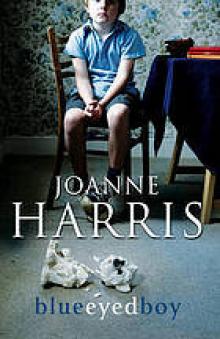 Blueeyedboy
Blueeyedboy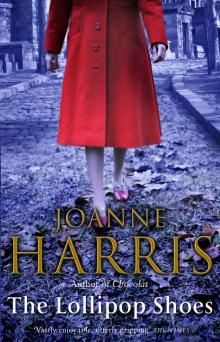 The Lollipop Shoes
The Lollipop Shoes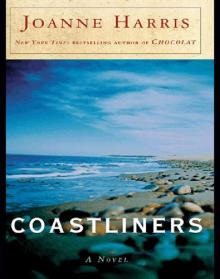 Coastliners
Coastliners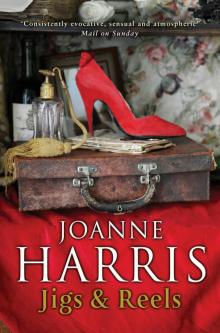 Jigs & Reels
Jigs & Reels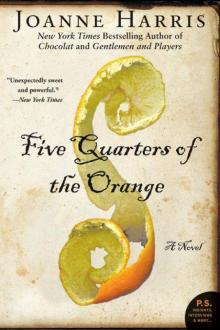 Five Quarters of the Orange
Five Quarters of the Orange